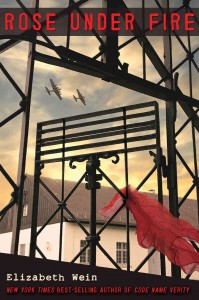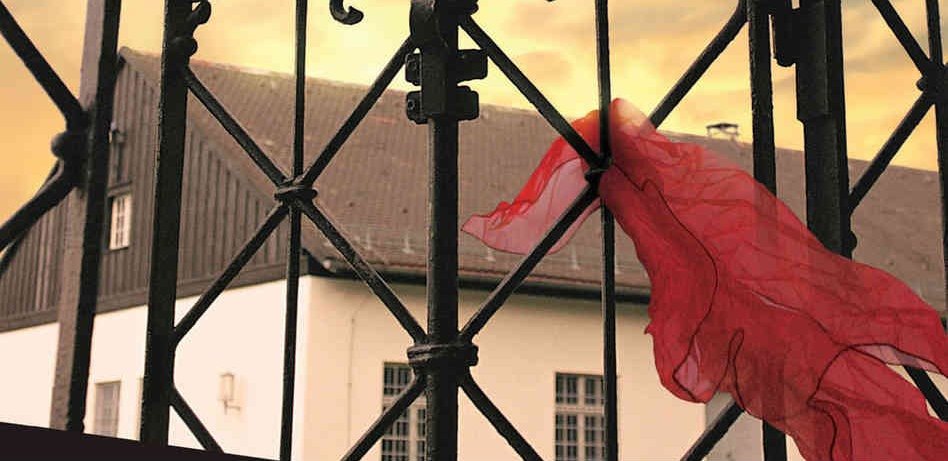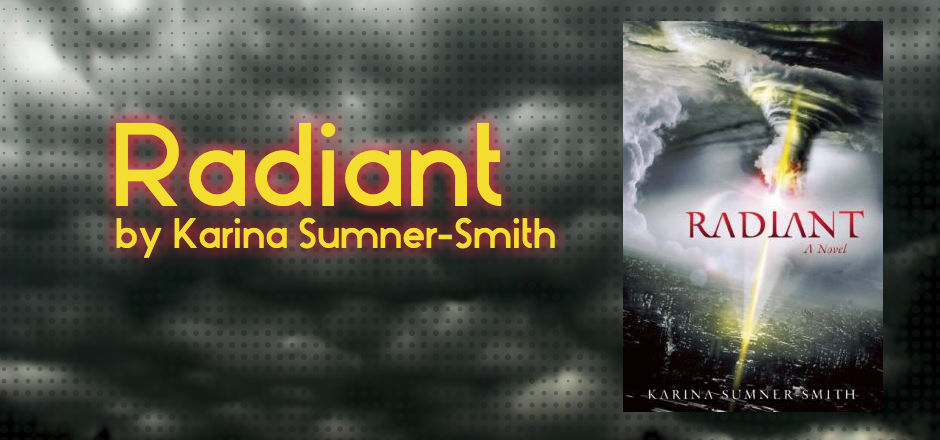Rose Under Fire by Elizabeth Wein is the companion novel to Code Name Verity, a YA historical fiction novel published in 2012 to critical acclaim. Rose Under Fire follows Rose Justice, a USA ATA pilot who ferried Allied fighter planes during World War II. During one of her assignments, she is captured by the Nazis and sent to Ravensbrück, a now infamous concentration camp for women. Living an unimaginable nightmare, she finds hope with her fellow inmates, but will that be enough to carry her through?
 Rose Under Fire is a book that tears you apart and puts you back together again. It left me breathless in more ways than one: I cried, I sobbed, I held my breath for these women, and cried with joy for every single victory, however short-lived, they shared. It’s obvious Wein has done her fair share of research to depict Ravensbrück, the Nazi soldiers, and the circumstances of its prisoners, and while one can expect to find starvation, executions and operations in the future of a book set in a concentration camp, you live and breathe with these characters and when execution lists appear, readers cannot help but feel for them. This was a ride of a book and I wouldn’t have wanted any less.
Rose Under Fire is a book that tears you apart and puts you back together again. It left me breathless in more ways than one: I cried, I sobbed, I held my breath for these women, and cried with joy for every single victory, however short-lived, they shared. It’s obvious Wein has done her fair share of research to depict Ravensbrück, the Nazi soldiers, and the circumstances of its prisoners, and while one can expect to find starvation, executions and operations in the future of a book set in a concentration camp, you live and breathe with these characters and when execution lists appear, readers cannot help but feel for them. This was a ride of a book and I wouldn’t have wanted any less.
The novel is written as a series of Rose’s diary entries, letters she’s received and articles she’s written. It also features some of her poetry, which relates to her circumstances at the time she crafted them. This structure allows for a comfortable way to read since sometimes, when the situation Rose is recalling is stressful, she interjects something else that can allow the reader a moment of respite. It also makes the account more personal since it feels as if Rose were telling it to the readers or rather handing her journal for others to read. The way Wein structured this novel is partly one of the reasons why I could get through it; I’m squeamish about reading anything that has to do with concentration camps, so it worked well for me.
That being said, Rose is a wonderful protagonist to follow; the reader can see how she was as she was starting out as an ATA pilot and how the experiences she went through at Ravensbrück shaped her into what she would become. She was surrounded by inspiring characters in the concentration camp like Irina, Róża, Karolina and Lisette, all different in their own way, all fighting not to be reduced to corpses by their captors. They taught and supported Rose; they gave her hope and strength, and didn’t allow her to lose herself and become one more prisoner, one more number.
Rose Under Fire is beautiful; Wein is a master with words, and I felt she could capture so much with just a handful of words. There was beauty in adversity, hope even though it felt hopeless and strength when it looked like Rose, her camp family and the rest of the prisoners could not go on. They were defiant against their captors, hiding each other when they were supposed to be executed and standing for hours as punishment without outing anyone. Like Rose herself said in one of her poems, “Fight with realistic hope, not to destroy / All the world’s wrong, but to renew its good.” Rose Under Fire is so powerful because all the women in this camp kept hoping, fighting for survival, and they were beautiful and strong even with the Nazis’ attempt at belittling them to prisoners, numbers and test subjects. They were always more than just prisoners with a number as an identity; they were human. And as humans, they fought to maintain hope, to survive, with the purpose to tell the world: and they did.
I recommend this novel to anyone, especially if there’s an interest in historical fiction dealing with Nazi concentration camps. Wein includes an Afterword that explains more on the subject and the reasoning behind the way she structured Rose Under Fire as well as a glossary and a bibliography of the sources she used. The novel provides a little window into Ravensbrück, but moreover, it’s inspiring in that it shows to never lose hope, to be resilient and that, even in the darkest of places and situations, there is always beauty.
5 out of 5 stars
This was an ARC acquired at BEA. The quote that appears in this review is subject to change in the final copy.






